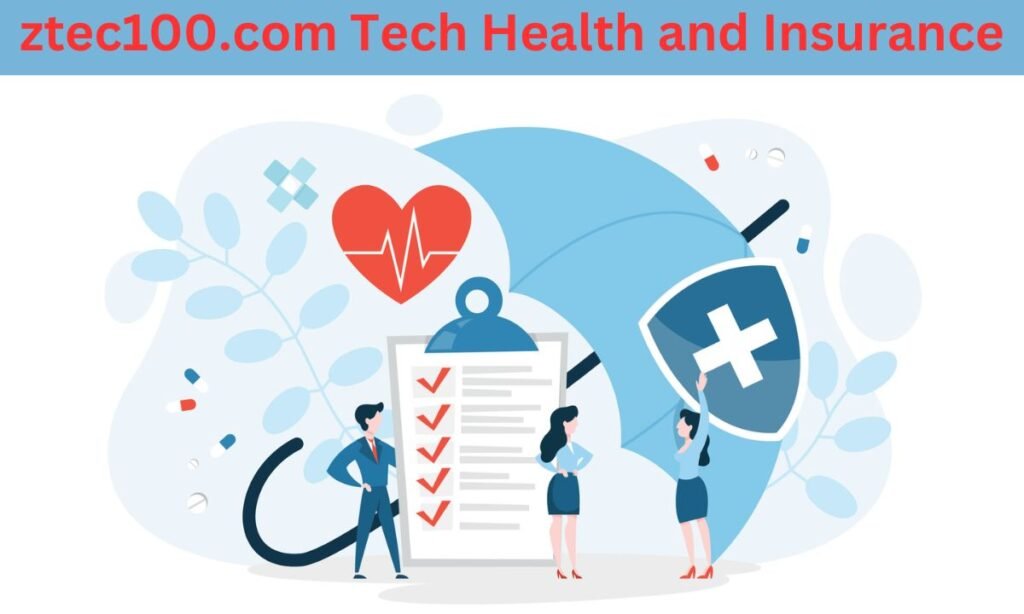In today’s rapidly evolving digital landscape, the intersection of ztec100.com tech health and insurance has never been more critical. The rise of telemedicine, digital health platforms, and innovative insurance solutions has transformed the way individuals manage their health and financial well-being. This guide offers a comprehensive overview of the essential aspects of tech health and insurance, providing insights into how these sectors converge to create a more efficient and accessible healthcare system.

Understanding the Intersection of ztec100.com tech health and insurance
As technology continues to advance, the healthcare and insurance industries are undergoing significant transformations. Digital health technologies such as wearable devices, telemedicine platforms, and health monitoring apps have revolutionized the way people manage their health. These technologies offer real-time data and insights that enable individuals to make informed decisions about their well-being.
At the same time, the insurance industry is adapting to these changes by offering innovative products and services that cater to the evolving needs of consumers. For instance, health insurance providers now offer policies that cover telemedicine consultations, digital health services, and even fitness programs. This integration of tech and insurance not only enhances the customer experience but also promotes preventive care and overall wellness.
The Role of Wearable Technology in Health Management
Wearable technology has emerged as a game-changer in the field of health management. Devices such as fitness trackers, smartwatches, and health monitoring bands allow individuals to track their physical activity, heart rate, sleep patterns, and more. These devices provide valuable data that can be shared with healthcare providers to monitor and manage chronic conditions.
Moreover, wearable technology plays a crucial role in preventive care. By continuously monitoring health metrics, these devices can alert users to potential health issues before they become serious. For example, a sudden increase in heart rate or a drop in oxygen levels could indicate an underlying health problem that requires immediate attention.
Insurance companies are increasingly recognizing the value of wearable technology in promoting healthier lifestyles. Some insurers offer discounts or rewards to policyholders who regularly use these devices to track their health. This not only incentivizes healthy behavior but also helps reduce healthcare costs in the long run.
Telemedicine: Revolutionizing Healthcare Access
Telemedicine has become a cornerstone of modern healthcare, especially in the wake of the COVID-19 pandemic. This technology enables patients to consult with healthcare providers remotely, eliminating the need for in-person visits. Telemedicine offers numerous benefits, including increased accessibility, convenience, and cost savings.
One of the key advantages of telemedicine is its ability to provide healthcare access to individuals in remote or underserved areas. Patients can receive medical advice, prescriptions, and follow-up care from the comfort of their homes. This is particularly beneficial for those with mobility issues or chronic conditions that require regular monitoring.
From an insurance perspective, telemedicine has led to the development of new coverage options. Many health insurance policies now include telemedicine services as part of their benefits package. This not only provides policyholders with greater flexibility but also helps insurers manage costs by reducing the need for expensive emergency room visits and hospitalizations.
Digital Health Platforms: The Future of Healthcare Management
Digital health platforms are transforming the way patients and healthcare providers interact. These platforms offer a wide range of services, including electronic health records (EHRs), online appointment scheduling, prescription management, and virtual consultations. By centralizing health data, digital platforms improve the efficiency and effectiveness of healthcare delivery.
One of the primary benefits of digital health platforms is the ability to provide personalized care. By analyzing patient data, these platforms can offer tailored health recommendations, reminders for medication adherence, and alerts for upcoming appointments. This level of personalization enhances patient engagement and promotes better health outcomes.
Insurance companies are also leveraging digital health platforms to streamline their operations. By integrating with these platforms, insurers can automate claims processing, verify coverage, and manage policyholder data more efficiently. This not only reduces administrative costs but also improves the overall customer experience.
Innovative Insurance Solutions for the Digital Age
As technology continues to reshape the healthcare landscape, insurance companies are developing innovative solutions to meet the changing needs of consumers. One such innovation is usage-based insurance (UBI), which adjusts premiums based on an individual’s health behaviors and lifestyle choices. By analyzing data from wearable devices and health apps, insurers can offer personalized policies that reward healthy behavior.
Another emerging trend is on-demand insurance, which allows consumers to purchase coverage for specific events or periods. This flexibility is particularly appealing to younger, tech-savvy individuals who prefer to pay for insurance only when they need it. On-demand insurance is often offered through mobile apps, making it easy for users to obtain coverage with just a few taps on their smartphones.
Additionally, blockchain technology is being explored as a way to enhance transparency and security in the insurance industry. Blockchain can be used to create immutable records of insurance transactions, ensuring that claims are processed accurately and efficiently. This technology has the potential to reduce fraud, lower costs, and improve trust between insurers and policyholders.
The Future of ztec100.com tech health and insurance
The convergence of technology, health, and insurance is paving the way for a more efficient and accessible healthcare system. As digital health technologies continue to evolve, we can expect to see even more innovative solutions that empower individuals to take control of their health and well-being.
For consumers, this means greater access to personalized care, more flexible insurance options, and the ability to make informed decisions about their health. For healthcare providers and insurers, the integration of technology offers opportunities to improve patient outcomes, reduce costs, and enhance the overall quality of care.
In conclusion, the intersection of ztec100.com tech health and insurance represents a significant shift in the way healthcare is delivered and managed. By embracing these advancements, we can create a healthcare system that is not only more efficient but also more equitable and patient-centered.
Also Read More:
Theapknews.shop Health & Beauty: The Comprehensive Guide
Share To Help
